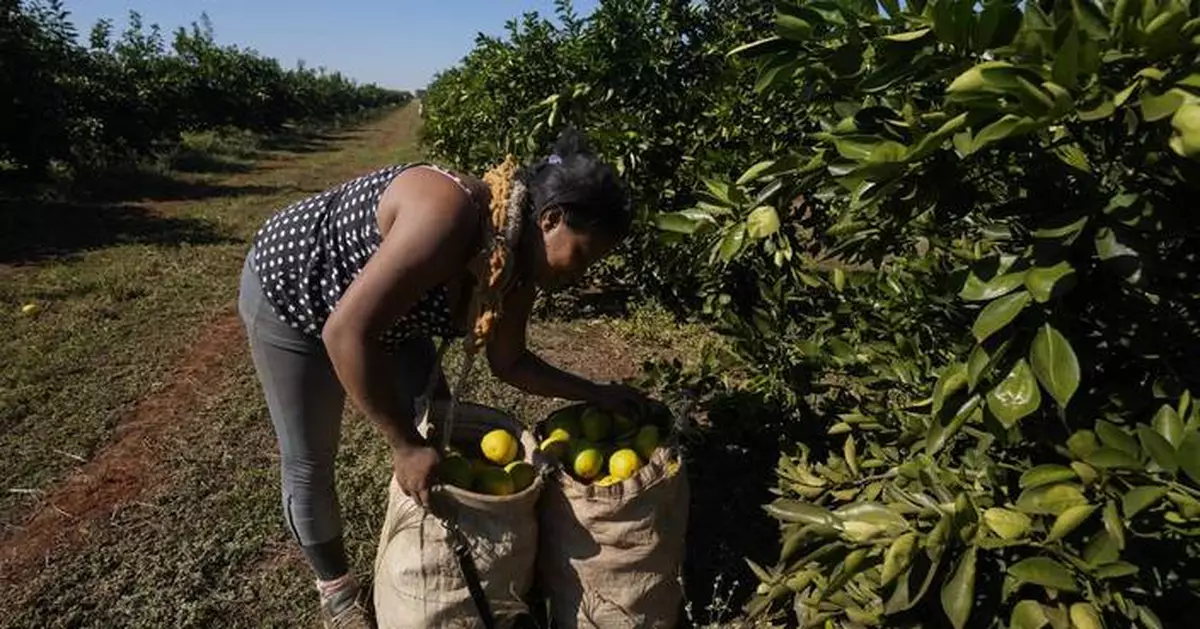MOGI GUACU, Brazil (AP) — Orange juice prices have always been volatile, falling when bumper harvests create an oversupply of oranges and rising when frost or a hurricane knocks out fruit trees.
But the record-high prices the world is seeing for OJ right now may be on the table for a while, since the diseases and extreme weather ravaging orange groves in some top-producing countries aren’t easily resolved problems.
Click to Gallery
An orange plantation lies in Mogi Guacu, Brazil, Thursday, June 13, 2024. Brazil, the world's largest exporter of orange juice, has been affected by heatwaves, a lack of rainfall and an increase in citrus greening bacteria. (AP Photo/Andre Penner)
Workers load a truck with recently harvested oranges on a farm in Mogi Guacu, Brazil, Thursday, June 13, 2024. Brazil, the world's largest exporter of orange juice, has been affected by heatwaves, a lack of rainfall and an increase in citrus greening bacteria. (AP Photo/Andre Penner)
A worker harvests oranges on a farm in Mogi Guacu, Brazil, Thursday, June 13, 2024. Brazil, the world's largest exporter of orange juice, has been affected by heatwaves, a lack of rainfall and an increase in citrus greening bacteria. (AP Photo/Andre Penner)
A spoiled orange hangs on a branch in a farm in Mogi Guacu, Brazil, Thursday, June 13, 2024. Brazil, the world's largest exporter of orange juice, has been affected by heatwaves, a lack of rainfall and an increase in citrus greening bacteria. (AP Photo/Andre Penner)
Orange farmer Oscar Simonetti examines his fruits, with some affected by citrus greening bacteria, at his plantation in Mogi Guacu, Brazil, Thursday, June 13, 2024. Brazil, the world's largest exporter of orange juice, has been affected by heatwaves, a lack of rainfall and an increase in citrus greening bacteria. (AP Photo/Andre Penner)
Workers harvest oranges on a farm in Mogi Guacu, Brazil, Thursday, June 13, 2024. Brazil, the world's largest exporter of orange juice, has been affected by heatwaves, a lack of rainfall and an increase in citrus greening bacteria. (AP Photo/Andre Penner)
A worker harvests oranges on a farm in Mogi Guacu, Brazil, Thursday, June 13, 2024. Brazil, the world's largest exporter of orange juice, has been affected by heatwaves, a lack of rainfall and an increase in citrus greening bacteria. (AP Photo/Andre Penner)
This year’s harvest in Brazil, the world’s largest exporter of orange juice, is likely to be the worst in 36 years due to flooding and drought, according to a forecast by Fundecitrus, a citrus growers’ organization in Sao Paulo state.
“The concern isn't just that the price of juice is going up. The concern is not having the juice,” Oscar Simonetti, an orange farmer in Mogi Guacu, Brazil, said.
In the U.S., Florida's already diminished orange production fell 62% in the 2022-2023 season after Hurricane Ian further battered a crop that was struggling due to an invasive pest. Drought also cut Spain’s orange production last year.
Scarce supplies have sent prices soaring. In the U.S., a 12-ounce can of frozen orange juice concentrate cost an average of $4.27 in April, 42% more than during the same month a year earlier, according to government figures.
In the United Kingdom, where the British Fruit Juice Association says supplies are at 50-year lows, the price of fresh orange juice rose 25% over the past year, according to consumer research company Nielsen.
Those price increases are turning off inflation-weary consumers. Orange juice consumption has fallen 15% to 25% in major global markets — including the U.S. and the European Union — over the last year, according to Rabobank, a Dutch bank that focuses on food and agriculture.
Jonna Parker, a principal for fresh food client insights at market research company Circana, said consumers are increasingly getting their morning fruit intake from energy drinks, smoothies and other beverages besides orange juice.
“The price gets high and people consider other alternatives,” she said.
Global orange juice consumption was already declining before the current price hikes due to competition from other drinks and public concern about the amount of sugar in fruit juices. If that trend continues, it should help balance supply with demand and keep prices from rising much further, Rabobank said. But it expects limited supplies will keep prices elevated for some time.
In some markets, orange juice is disappearing from shelves altogether.
Late last year, McDonald’s in Australia removed orange juice from its menu in favor of an “orange fruit drink” that contains 35% orange juice. The company cited short supplies.
Tokyo-based Morinaga Milk Industry Co. expects to stop shipping its Sunkist brand orange juice – which uses juice from Brazil – by the end of June because of low juice supplies from Brazil, a company spokeswoman said. In April 2023, Megmilk Snow Brand Co., based in the northern Japanese city of Sapporo, stopped shipments of 1-liter (about a quart) and 450-milliliter (15.2-ounce) packs of orange juice, which it sells under an agreement with Dole. Sales haven’t yet resumed.
Some companies are considering using alternatives to oranges in their products. Coldpress, a British juice company, introduced a mandarin juice product in February, citing the high price of regular juicing oranges.
But others are tight-lipped about their plans. Several major orange juice makers – including Dole, Tropicana, Florida’s Natural, Uncle Matt’s and Coca-Cola, which makes the Simply and Minute Maid brands – declined to comment or failed to respond to inquires from The Associated Press.
The roots of the current supply troubles stretch back decades. In 2005, an invasive bug called the Asian citrus psyllid arrived in Florida, injecting bacteria from its saliva into the state’s orange trees. The bacteria slowly kills the tree by destroying its root systems. There’s no known cure once a tree is infected.
The impact has been devastating. In 2004, before the disease – called citrus greening – hit Florida, the state produced 200 million boxes of oranges. This year, it will produce less than 20 million.
Michael Rogers, a professor of entomology and the director of the University of Florida’s Citrus Research and Education Center, said no type of orange tree is totally resistant to greening, but scientists have been trying to breed trees that are more tolerant of it.
Citrus greening arrived in Brazil around the same time as Florida, but it has progressed more slowly there because Brazil has much larger orange groves. Bugs spread the disease by flying from tree to tree, Rogers said.
Still, the disease is spreading. Fundecitrus estimates that 38% of Brazil’s orange trees had citrus greening in 2023. Simonetti, the orange farmer, estimates that 20% of his production is affected by greening. Oranges on affected trees don't ripen properly and fall off early, affecting the quality of their juice, he said.
Shifting production to other locations isn’t necessarily an option. California grows oranges, for example, and the citrus psyllid doesn’t fare as well in the state’s climate. But California also doesn’t get the rainfall needed for juicing oranges; its oranges are usually sold for eating, Rogers said.
Another issue impacting orange harvests is extreme weather, which is becoming more common as the world warms due to climate change.
Last year, nine heat waves swept across Brazil, resulting in lower output and poorer fruit quality. This year, the impacts of El Niño have been particularly dramatic, with a historic drought in the Amazon and devastating floods in the southern state of Rio Grande do Sul.
“The temperatures are high during the day. At night the temperature drops. The plant can't stand this temperature difference,” Simonetti said.
Brazil’s 2024-2025 harvest is expected to yield 232 million boxes of oranges, down 24% from the prior year.
“We have never seen a harvest like this,” Vinícius Trombin, the coordinator of Fundecitrus’ crop estimates survey, said.
To make up for the anticipated smaller yield, some producers are considering blending oranges with tangerines to make juice, Trombin said. But he’s skeptical.
“The consumer wants an orange juice made up 100% out of oranges,” he said.
Parker, of Circana, isn’t so sure. She thinks blends with other fruits might help hold down costs and revive consumer interest in orange juice.
“The idea of multiple flavors is very popular and is a way to stand out,” she said. “You’ve got to keep people engaged. Once you lose that interest, it’s really hard to get people back.”
Durbin reported from Detroit. AP Writers Yuri Kageyama in Tokyo and Eleonore Hughes in Rio de Janeiro contributed.

An orange plantation lies in Mogi Guacu, Brazil, Thursday, June 13, 2024. Brazil, the world's largest exporter of orange juice, has been affected by heatwaves, a lack of rainfall and an increase in citrus greening bacteria. (AP Photo/Andre Penner)

Workers load a truck with recently harvested oranges on a farm in Mogi Guacu, Brazil, Thursday, June 13, 2024. Brazil, the world's largest exporter of orange juice, has been affected by heatwaves, a lack of rainfall and an increase in citrus greening bacteria. (AP Photo/Andre Penner)
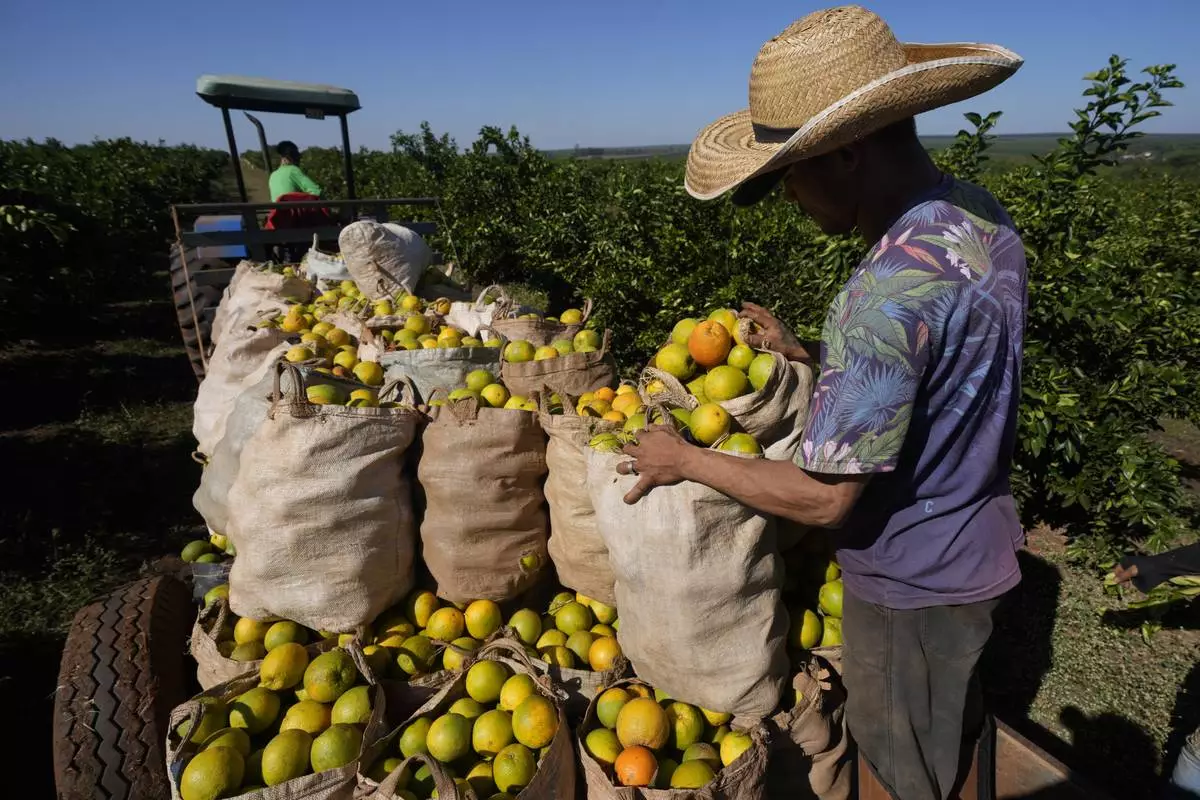
A worker harvests oranges on a farm in Mogi Guacu, Brazil, Thursday, June 13, 2024. Brazil, the world's largest exporter of orange juice, has been affected by heatwaves, a lack of rainfall and an increase in citrus greening bacteria. (AP Photo/Andre Penner)
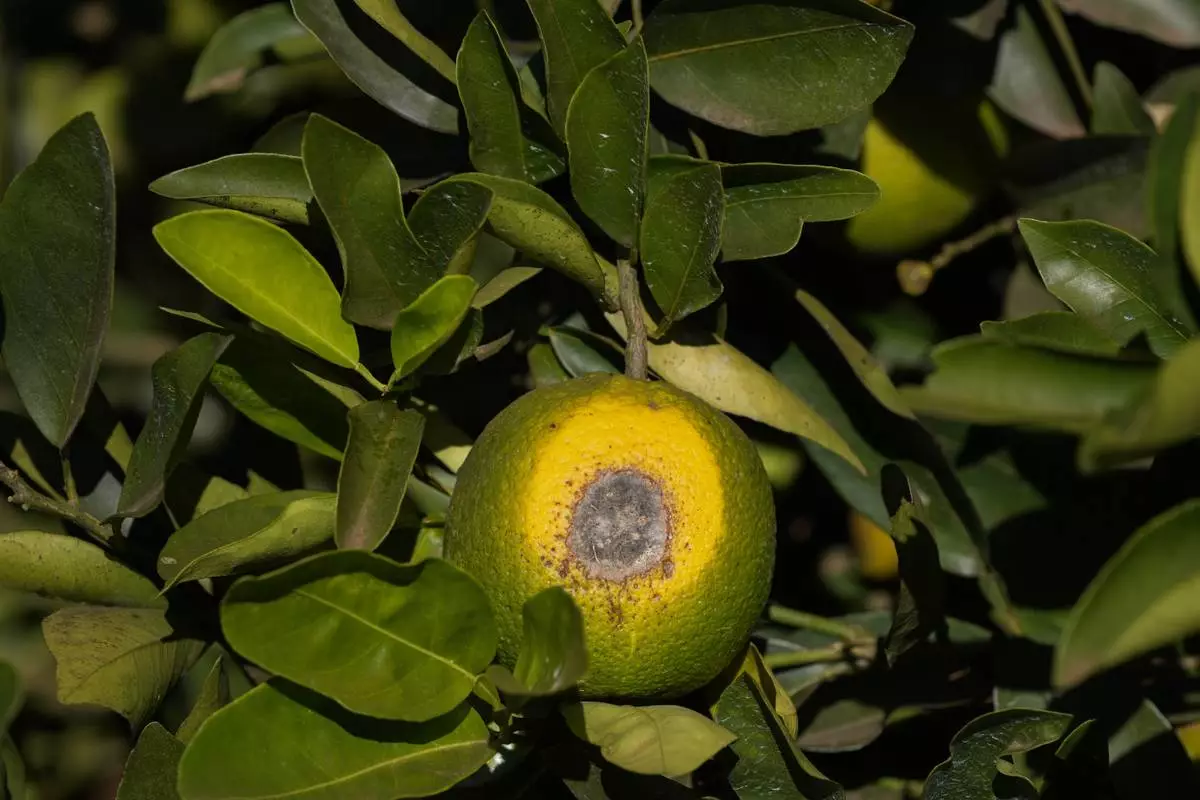
A spoiled orange hangs on a branch in a farm in Mogi Guacu, Brazil, Thursday, June 13, 2024. Brazil, the world's largest exporter of orange juice, has been affected by heatwaves, a lack of rainfall and an increase in citrus greening bacteria. (AP Photo/Andre Penner)
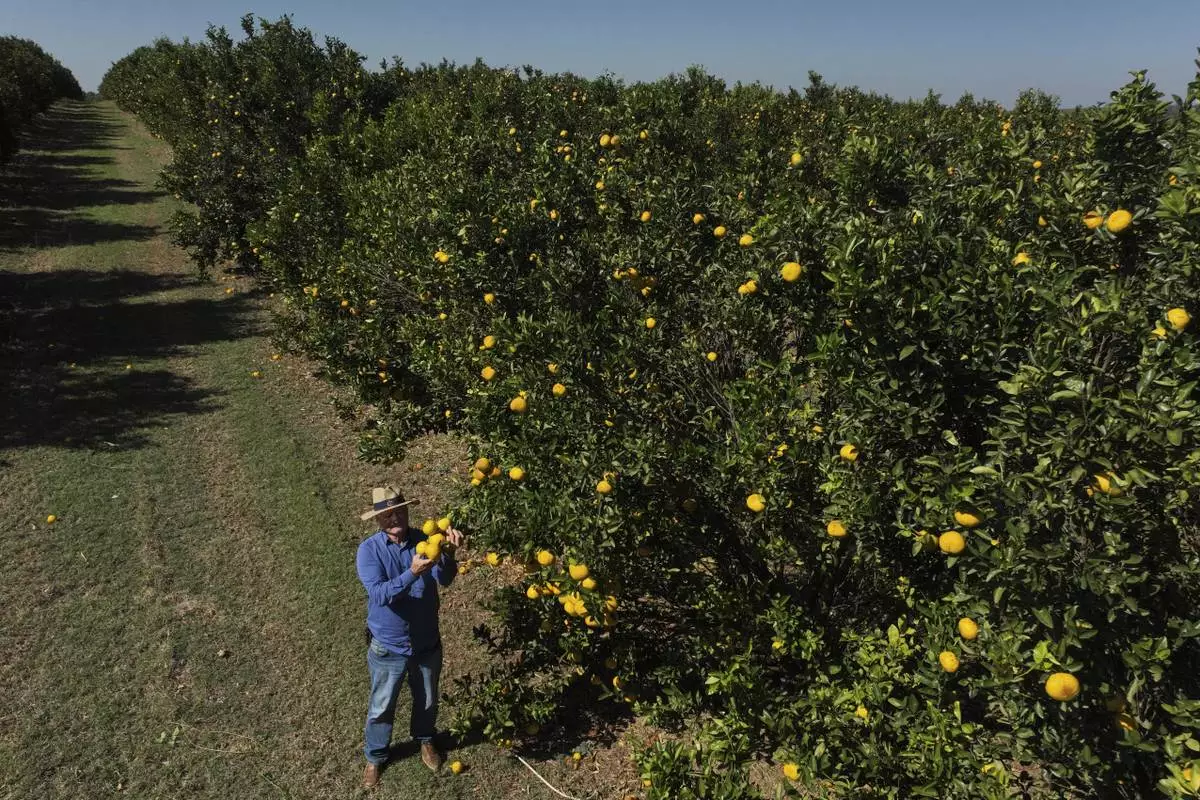
Orange farmer Oscar Simonetti examines his fruits, with some affected by citrus greening bacteria, at his plantation in Mogi Guacu, Brazil, Thursday, June 13, 2024. Brazil, the world's largest exporter of orange juice, has been affected by heatwaves, a lack of rainfall and an increase in citrus greening bacteria. (AP Photo/Andre Penner)
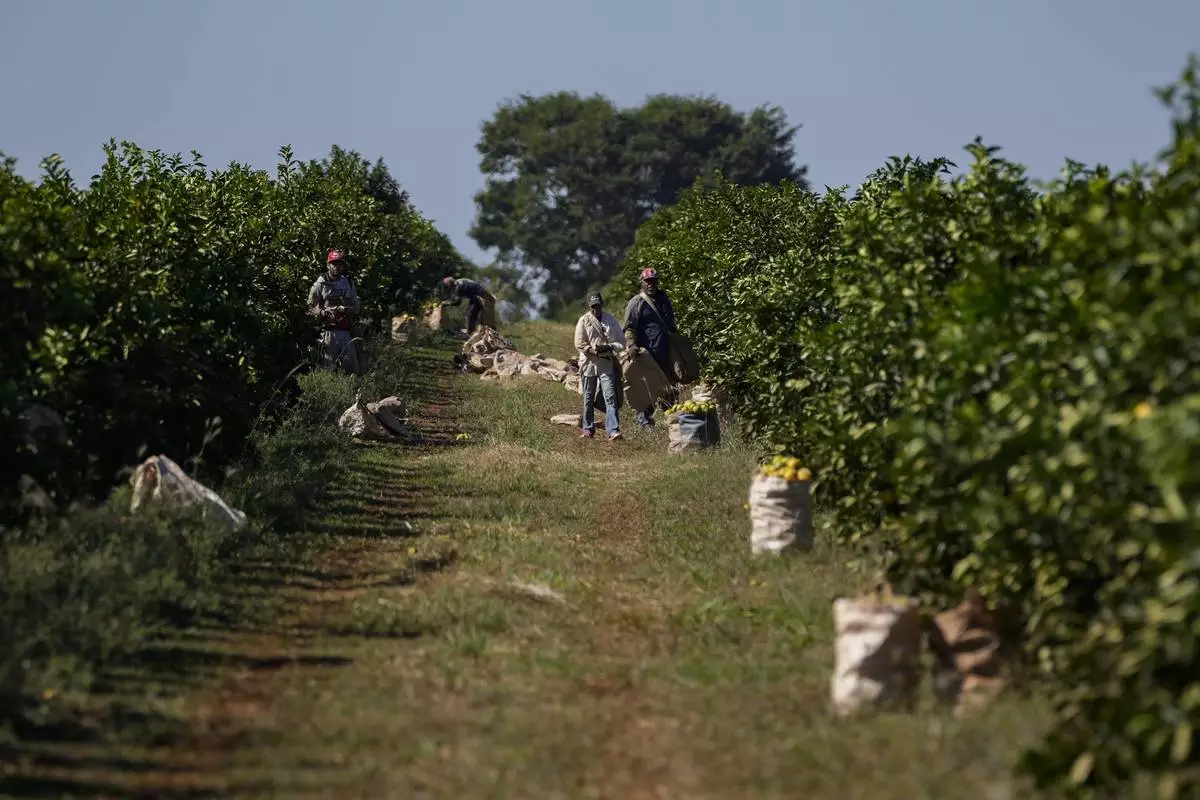
Workers harvest oranges on a farm in Mogi Guacu, Brazil, Thursday, June 13, 2024. Brazil, the world's largest exporter of orange juice, has been affected by heatwaves, a lack of rainfall and an increase in citrus greening bacteria. (AP Photo/Andre Penner)
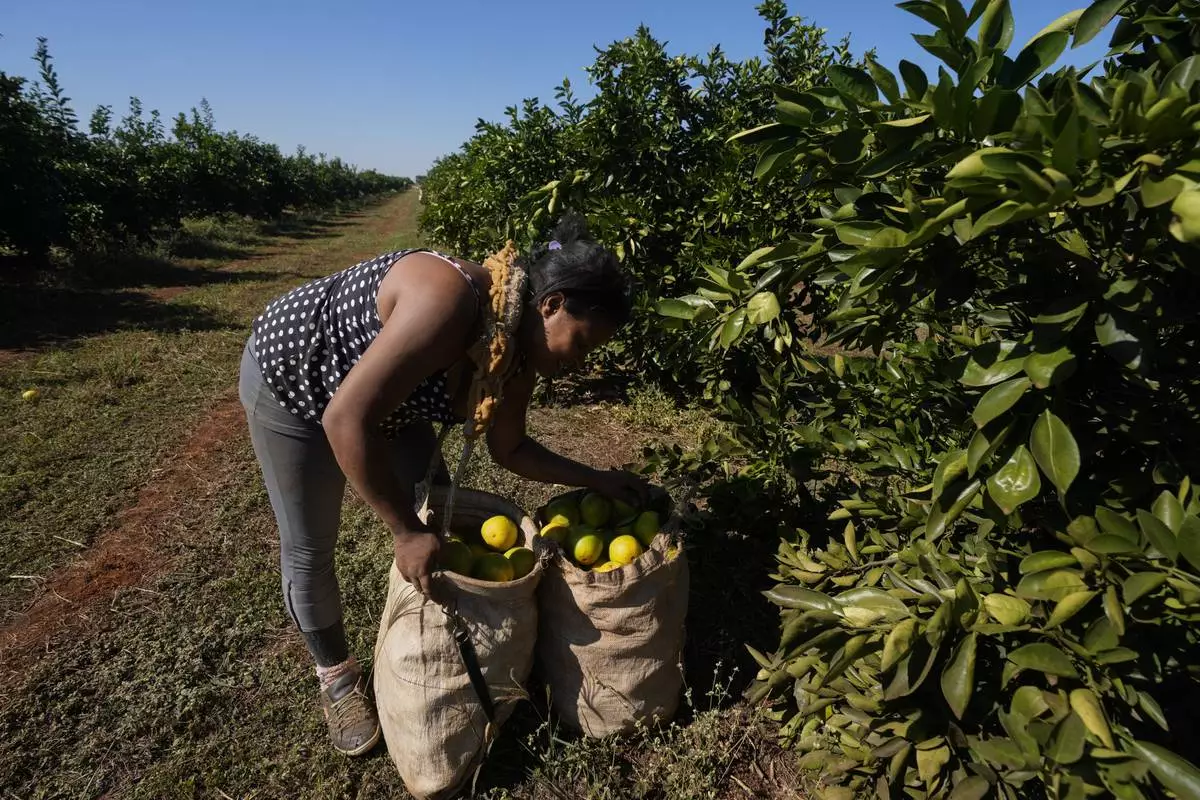
A worker harvests oranges on a farm in Mogi Guacu, Brazil, Thursday, June 13, 2024. Brazil, the world's largest exporter of orange juice, has been affected by heatwaves, a lack of rainfall and an increase in citrus greening bacteria. (AP Photo/Andre Penner)
ATLANTA (AP) — After losing the White House and both houses of Congress, Democrats are grappling with how to handle transgender politics and policy following a campaign that featured withering and often misleading GOP attacks on the issue.
There is plenty of second-guessing after President-elect Donald Trump anchored his victory over Vice President Kamala Harris with sweeping promises on the economy and immigration. But Democrats also will not soon forget the punchline in anti-transgender Trump ads that became ubiquitous by Election Day: “Kamala is for they/them; President Trump is for you.”
“Week by week when that ad hit and stuck and we didn’t respond, I think that was the beginning of the end,” former Democratic Pennsylvania Gov. Ed Rendell said of the 30-second spot that was part of $215 million in anti-transgender advertising by Trump and Republicans, according to tracking firm AdImpact.
“They painted her as something I don’t think she is," Rendell said. “They painted her as a far-left liberal.”
The fallout leaves some progressive and moderate Democrats struggling between the party’s modern identity as a champion of civil rights and its electoral fortunes across swaths of America with whom those attacks resonated.
“There are just a number of issues where we’re out of touch,” Rep. Seth Moulton, a moderate Massachusetts Democrat said in an interview, days after he set off recriminations within his party for saying he didn't want his daughters playing in sports against biological males. Critics said Moulton echoed Trump’s talking points about liberals allowing “men to compete in women’s sports.”
“I think that Republicans have a hateful position on trans issues,” Moulton told The Associated Press, but insisted that Democrats still lose voters because of the party’s “attitude.”
“Rather than talk down to you and tell you what to believe,” he argued, Democrats should “listen to hard-working Americans.”
LGBTQ+ advocates, meanwhile, are arguing that the 2024 election turned more on economic issues than Trump’s transgender rhetoric. They're urging political leaders to counter misinformation that they say threatens the health and safety of transgender Americans, who make up less than 1% U.S. population.
“Trans people have been existing and co-existing,” receiving health care and participating in society for years, said Sarah Kate Ellis, CEO of GLAAD, a leading LGBTQ+ advocacy group. “Nothing new happened,” Ellis said, other than Republicans singling them out in a presidential campaign year.
“It didn’t change one vote,” Ellis argued. “But it did make the world way more dangerous for trans people.”
Another Democratic Massachusetts lawmaker, Rep. Ayanna Pressley, didn't name Moulton, but said some reactions to the election “scapegoated and dehumanized” transgender people. “This Congresswoman sees you and loves you,” Pressley wrote on the social media platform X.
Certainly it’s difficult, if not impossible, to pinpoint single issues that can tip a national election, and there are mixed findings on what voters think about transgender rights.
According to AP VoteCast, a survey of more than 120,000 people who cast ballots this fall, more than half of voters said support for transgender rights in government and society has gone too far. About 2 in 10 said support has not gone far enough and another 2 in 10 said it’s about right. But among Trump voters, 85% said transgender support had gone too far.
Still, slightly more than half of all voters oppose banning gender affirming medical treatment such as hormone therapy and puberty blockers, while slightly less than half support such proposals.
About one-quarter of Harris voters said support for transgender rights in government and society has gone too far. About 4 in 10 said it’s been about right and about 4 in 10 said it hasn’t gone far enough.
Trump and Republicans were relentless in trying to capitalize on the issue. They piled on transgender athletes, with Trump falsely labeling two Olympic boxers as transgender women. They used Harris' comments as a presidential candidate in 2019 — before she became vice president — effectively to blame her for laws granting transgender health care to federal prisoners and detainees.
And Trump repeatedly and falsely claimed that “your kid goes to school and comes home a few days later with an operation” changing their sex.
In reality, the Biden administration has held that Title IX bars discrimination based on sexual orientation and gender identity — but Education Department rules do not explicitly address transgender athletes. Federal law that Trump ads cited does require people in U.S. government custody to have access to gender-affirming medical treatments. Those policies were in place throughout Trump’s 2017-21 term; they are not something Biden’s administration instituted specifically.
And it is not legal in any state for a school to determine and carry out surgical treatment for minor students.
“You gotta fight back” with those explanations, Moulton said, adding that the silence compounds the negative effects for transgender people. “What did we show about our willingness to stand up for trans people by just being silent and ignoring the issue and ignoring the attack?”
Still, Moulton said Democratic leaders on Capitol Hill and in statehouses should give individual elected officials and voters the space to take more conservative positions, and he defended his own comments that he doesn't want his daughters competing in athletics against men.
“I don’t want them getting run over on a playing field by a male or formerly male athlete, but as a Democrat I’m supposed to be afraid to say that,” Moulton told The New York Times last week.
Before he resigned his post as Texas Democratic chairman, Gilberto Hinojosa said supporting transgender rights doesn’t necessarily have to include public funding for gender reassignment surgery.
“We can say, ’OK, we respect people’s right to say, we don’t want my taxpayer money to be used for that,'" Hinojosa told Texas Public Radio. Hinojosa later apologized via social media, saying LGBTQ Americans “deserve to feel seen, valued and safe in our state and our party.”
Ellis, the CEO of GLAAD, pointed to Delaware voters choosing to make state Sen. Sarah McBride the first transgender member of Congress as evidence that Americans “don’t hate trans people.”
For her part, McBride, a Democrat from Delaware, noted that she did not run on her identity – though it was not a secret – and instead talked to voters about “affordable health care, housing and child care” for everyone.
“The party that was focused on culture wars, the party that was focused on trans people was the Republican Party,” McBride told reporters on Capitol Hill after her victory. “It was Donald Trump,” she added, who “was trying to divide and distract from the fact that he has absolutely no policy solutions for the issues that are actually keeping voters up at night.”
Levy reported from Harrisburg, Pennsylvania. Associated Press writer Farnoush Amiri in Washington contributed to this report.

Sarah McBride, Democratic candidate for Delaware's at-large congressional district, speaks during an election night watch party Tuesday, Nov. 5, 2024, in Wilmington, Del. (AP Photo/Pamela Smith)

Republican presidential nominee former President Donald Trump stands on stage with former first lady Melania Trump, as Lara Trump watches, at an election night watch party at the Palm Beach Convention Center, Wednesday, Nov. 6, 2024, in West Palm Beach, Fla. (AP Photo/Evan Vucci)

FILE - Protesters advocating for transgender rights and healthcare stand outside of the Ohio Statehouse, Jan. 24, 2024, in Columbus, Ohio. (AP Photo/Patrick Orsagost, File)









